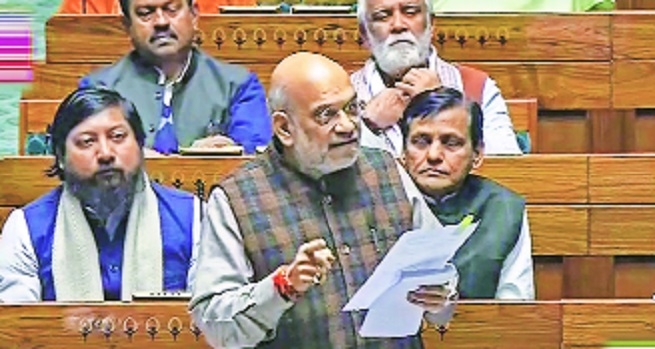Lok Sabha passes three bills to replace IPC, CrPC, Evidence Act
21 Dec 2023 07:06:06

NEW DELHI :
LEGAL LANDMARK
“The existing criminal laws were reflective of the colonial mindset with the intention to punish and not impart justice. The three new bills seek to establish a justice system based on Indian thinking. The new criminal laws will free people from colonial mindset and its symbols,” said Home Minister Amit Shah.
THE Lok Sabha on Wednesday passed three key bills that seek to overhaul the criminal justice system, with Union Home Minister Amit Shah asserting that the focus is on delivering speedy justice rather than handing down punishment.
Replying to the debate, Shah said the three bills - Bharatiya Nyaya (Second) Sanhita, Bharatiya Nagarik Suraksha (Second) Sanhita and the Bharatiya Sakshya (Second) Bill -- also have a clear definition of terrorism and scrap sedition as a crime while introducing a new section titled “offences against the State”.
Members of the Congress, DMK, TMC and other Opposition parties were not present during the debate after 97 of their colleagues were suspended from Lok Sabha for “unruly” behaviour in the House.
While many opposition parties have been critical of the bills that seek to replace the IPC, CrPC and the Evidence Act, only a handful of non-NDA members, including Hyderabad MP and AIMIM chief Asaduddin Owaisi, MPs of the Biju Janata Dal and Bahujan Samaj, were present in the House.
“I am astonished at how some people defend and save the lives of terrorists in the name of ‘human rights’. Remember, this is neither the rule of Britishers nor of Congress. This is Modi’s rule.
“No arguments to save terrorists will be entertained here,” Shah said, adding the Modi Government has explicitly brought ‘terrorism’ under the purview of the criminal
justice system.
“We have changed the definition of Sedition from ‘Rajdroh’ (offences against the Government) to ‘Deshdroh’ (offences against the Nation),” he said noting IPC Section 124, or the Sedition Law, has been repealed.
“The existing criminal laws were reflective of the colonial mindset with the intention to punish and not impart justice. The three new bills seek to establish a justice system based on Indian thinking. The new criminal laws will free people from colonial mindset and its symbols,” said the Home Minister.
The purpose of the new law is “not to save the Government, but to save the country. In a healthy democracy, everyone has the right to criticise the Government, but we will not allow anyone to say anything demeaning about India,” Shah said.
“The sedition law made by the British, under which Tilak, Mahatma Gandhi, Sardar Patel..., many of our freedom fighters remained in jail for years and that law continues till date.
“When they were in Opposition, they used to protest, but when they came to power, they misused it. For the first time, the Modi Government completely abolished the sedition law,” he said.
Shah said, the first duty of the State is justice. “Judiciary, Executive and Legislature are the three pillars of democracy. The makers of our Constitution divided the work among these three to give strong administration to the country. Today, for the first time, these three together will give the country a justice-centric criminal system and not a punishment-centric one,” he said,
For the first time, laws are going to be made according to the spirit of our Constitution under the leadership of Modi. “I am proud to have changed these three laws after 150 years. Some people used to say that we do not understand them, I tell them that if you keep your mind as an Indian then you will understand. But if your mind is of Italy, you will never understand,” Shah said in a swipe at the Opposition Congress.
The new laws are framed by keeping in mind the core values of our Constitution- individual freedom, human rights and equal treatment for all, Shah said.
The bills were first introduced during the Monsoon session of Parliament in August.
After the standing committee on home affairs made several recommendations, the Government decided to withdraw the bills and introduced their redrafted version last week.
Replying to the debate, which started on Tuesday and continued on Wednesday, Shah said three major amendments have been brought in the bills and these include giving relief to medical professionals who sometimes face intimidation from kin of patients.
Shah said the three proposed laws were drafted after comprehensive consultations. “I personally had 158 meetings. Not only every line, I have read every comma and every full stop of the bills,” he said.
Listing the features of the bills, Shah said, “This bill punishes mob lynching with the death penalty.
“(Congress leader P) Chidambaram kept asking me what about mob lynching. He does not understand the BJP and our mentality. Why did you not penalise mob lynching during your rule?
“This is the first Government which has fulfilled the promises it has mentioned in its manifesto.
We have revoked Article 370, removed AFSPA in 70 per cent areas in the north-eastern States, banned triple talaq and gave 33 per cent reservation to women in Parliament,” he said.
“There was no time limit for plea bargaining earlier. Now if one accepts their crime within 30 days of the crime then the punishment would be less...,’ he said.
The minister said a provision for “trial in absentia” has also been introduced.
